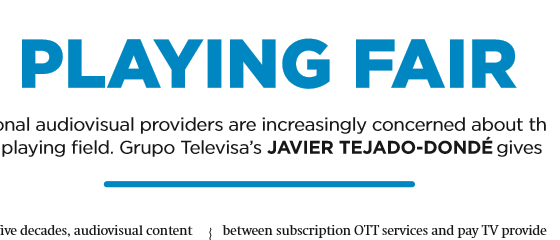
By JAVIER TEJADO-DONDÉ
Over the past five decades, audiovisual content distribution services have evolved in many ways. In the 1970s, free-to-air TV was the main platform for content distribution and thereafter technological evolution allowed pay TV to go mainstream. However, it was not until the past decade that such providers started facing additional competition from a variety of sources and within a quite short time span.
Suddenly, higher broadband adoption and technical capabilities in both provision and consumption has allowed the internet to become an audiovisual content distribution platform that, given its nature, has introduced a great variety of relevant actors to the industry.
By banishing barriers to entry, the internet has made it possible for single users and companies alike to massively distribute audiovisual content at a very low cost. What started out as a new and clearly differentiated set of audiovisual content has rapidly morphed into first a complement and now a substitute to traditional content distribution platforms, as in the so-called ‘cord-cutting’ and ‘cord-shaving’ phenomena.
Additional competition is always a good thing - more diverse content from different sources means fulfilling previously unsatisfied consumer needs while making other providers offer innovative products and services. However, such a way to compete is inherently flawed if, as now is the case, the playing field is unbalanced or tilted towards one side, thus benefiting a set of players over the others.
Such unbalance comes from three main factors. First, traditional pay TV operators face a set of regulations concerning content distribution such as must-carry obligations that are currently not applicable to over the top (OTT) services and make the provision of their services costlier in many cases. Second, pay TV operators face, in many jurisdictions, special taxes and duty schemes which OTT services are not subject to – and even more dramatic is the fact that in most countries OTT services operated from abroad do not have to pay a single penny in taxes. The third factor comes from technological convergence, given that many pay TV operators are now broadband providers as well and must deal with the consequences of increased traffic coming from growing adoption of OTT services among their subscribers.
Traditional audiovisual providers are increasingly concerned about the lack of a level playing field. Grupo Televisa's JAVIER TEJADO-DONDÉ gives his view.
- Intermedia Issue:
- Vol 45, Issue 02
- Issue Date:
- July 2017
 Javier Tejado Dondé
Vice President of Information to the Presidency, Grupo Televisa; Secretary, OTI Council (Organización De Telecomunicaciones De Iberoamérica
Javier Tejado Dondé
Vice President of Information to the Presidency, Grupo Televisa; Secretary, OTI Council (Organización De Telecomunicaciones De Iberoamérica 


